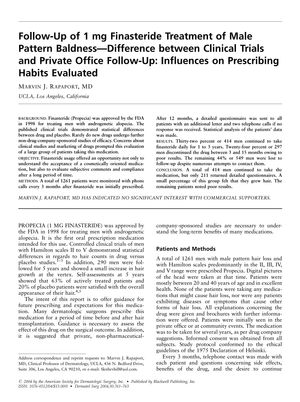TLDR Most men stopped using finasteride for baldness due to unsatisfactory results or were lost to follow-up, and those who continued saw minimal to moderate improvement.
In a retrospective study from 2004, 1,261 men were prescribed 1 mg finasteride for male pattern baldness and followed up via phone calls every 3 months. After 1 to 3 years, only 32% (414 men) continued with the treatment, 24% (297 men) stopped due to unsatisfactory results, and 44% (549 men) were lost to follow-up. Of the men who continued, 211 returned detailed questionnaires, with only a small percentage reporting hair growth. The study aimed to inform future prescribing practices and set realistic expectations for finasteride, underscoring the necessity for independent studies to assess long-term outcomes. The findings suggested that patients perceived the drug's benefits as minimal to moderate, and the study highlighted the need for objective measures in clinical trials to prevent bias in prescribing decisions.
 30 citations
,
December 1999 in “International Journal of Dermatology”
30 citations
,
December 1999 in “International Journal of Dermatology” Finasteride increases hair count in middle-aged and elderly men without causing sexual dysfunction.
 187 citations
,
June 1999 in “Journal of The American Academy of Dermatology”
187 citations
,
June 1999 in “Journal of The American Academy of Dermatology” Finasteride effectively treats frontal hair loss with few side effects.
 581 citations
,
October 1998 in “Journal of The American Academy of Dermatology”
581 citations
,
October 1998 in “Journal of The American Academy of Dermatology” Finasteride safely and effectively treats male pattern hair loss, but may cause reversible sexual issues and harm male fetuses.
 50 citations
,
July 2014 in “International Journal of Clinical Pharmacology and Therapeutics”
50 citations
,
July 2014 in “International Journal of Clinical Pharmacology and Therapeutics” New finasteride solution effectively reduces baldness-causing hormone, potentially with fewer side effects.
 22 citations
,
December 2010 in “Journal of Cosmetic Dermatology”
22 citations
,
December 2010 in “Journal of Cosmetic Dermatology” Finasteride may increase depression by reducing brain cell growth.
 January 2018 in “Surgical and Cosmetic Dermatology”
January 2018 in “Surgical and Cosmetic Dermatology” Finasteride and dutasteride are effective for male hair loss and enlarged prostate but may cause reversible sexual side effects.
 20 citations
,
April 2002 in “PubMed”
20 citations
,
April 2002 in “PubMed” Finasteride 1 mg/day for five years effectively improves hair growth and slows hair loss in men with male pattern baldness, and is safe for long-term use.
 November 2020 in “Elsevier eBooks”
November 2020 in “Elsevier eBooks” Antiandrogens and androgen inhibitors like spironolactone, finasteride, and dutasteride can treat hair loss and skin conditions, but they have risks and side effects, including potential harm to pregnant women and risks of cancer and heart issues. Herbal remedies also have antiandrogenic effects but lack safety validation.








